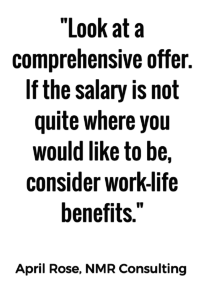INSIDE THE 
NEWS + ADVICE
Negotiate Your Salary Offer
 Everyone hopes for the perfect offer – the great job in a wonderful company with super pay and benefits. But often we don’t get there without some negotiating. And since it is something most of us do rarely, we are not sure how to go about getting something in an offer changed.
Everyone hopes for the perfect offer – the great job in a wonderful company with super pay and benefits. But often we don’t get there without some negotiating. And since it is something most of us do rarely, we are not sure how to go about getting something in an offer changed.
Ideally you will make up a decision checklist early in your job search that covers all your goals and what tradeoffs you will make. And as a part of deciding what you want – and what you will accept – include pay and maybe even benefits parameters. If you have not done this, do it now.
Tip 1: Know your value
Do your homework about both external market trends and pay data for your work and about the value you can demonstrate to an employer. This ensures you will have a realistic range to offer when you are asked about pay expectations.
Biggest mistakes here are pay expectations which really exceed market, and telling an employer one pay range in the interview process and then saying that an offer in that range is unacceptably low. Check out PayScale.com, Salary.com and Glassdoor.com to gather current salary and market data. Network with others in your profession and your professional association and ask them for salary information.
Tip 2: Know what you want
If the job and the organization are right, then it is worth trying to improve the pay or some other aspect of the offer.
Biggest mistake here is if the job and organization are not a good match for your career goals or success needs, more pay and benefits won’t make it right.
Tip 3: Be realistic
Once you have an offer, you can accept it as is, reject it, or decide it is close enough to your desires to be worth negotiating. Many employers will do some negotiating. You should be trying to learn whether a target employer does this as a part of your research.
Understand: you can improve your chances of getting closer to what you want by asking for 1-2 critical changes, not for a long list.
Be aware that some aspects of an offer cannot be changed. The terms of medical insurance and retirement plans for example. Base pay, incentives, stock/options, vacation, telecommuting options, and relocation expenses are often negotiated.
Biggest mistake is if you are asking to change a lot of the offer, ask yourself if this is really a good match to your needs. An employer is going to wonder about your interest in the company and position if you ask for too many changes. And some may withdraw an offer.
 Tip 4: Create your change request
Tip 4: Create your change request
Sit down and write out the 1-3 changes you want and why. Then rank them. Here is an easy format.
The most critical change I want is this:
Current offer:
Difference between what I want and current offer:
Supporting business reasons for this change:
Options I would also consider:
Next think about what you will settle for. Is the original offer acceptable if the organization refuses to change it or will you walk away? If you can only get your highest priority change made will that be enough?
Once you have done this you are ready to call the hiring manager and talk about what you love about the organization and the job and what your concerns are with the offer. Do this quickly after you receive the offer. You want to convey your commitment and enthusiasm. And you want the hiring manager to see you as reasonable but confident in your value.
Be willing to offer alternatives – i.e. if you cannot get more pay immediately can you get a 3 month review or be included in a bonus program? Be positive about working with the hiring manager and remind her that you will make immediate contributions.
April Rose, Recruiter for NMR Consulting, recommends:
“Look at a comprehensive offer. If the salary is not quite where you would like to be, consider work-life benefits. Ask to be bumped to the next tier PTO accrual, or ask for an additional week of PTO to be front-loaded as part of your offer. Ask for a sign-on bonus. You can be creative with this as well. If they say no to a sign-on bonus up front, ask if it can be paid to you over a three or six month period.”
Biggest mistake here is asking for more time to consider the offer, once they have made changes in response to your request. It is smart to ask for the changes to be confirmed in writing, but accept them as soon as you receive them.
There you have it:
- Know your value
- Know the external marketplace
- Go for the most important changes, and
- Have good reasons to help the hiring manager justify making the changes.
Be positive and keep your eye on the important things: The right job in the right organization for you, with the compensation package that makes sense to both sides = win-win.
 Patra Frame is ClearedJobs.Net’s HR Consultant. She is an experienced human resources executive and founder of Strategies for Human Resources. Patra is an Air Force veteran and charter member of the Women in Military Service for America Memorial. Follow Patra on Twitter @2Patra.
Patra Frame is ClearedJobs.Net’s HR Consultant. She is an experienced human resources executive and founder of Strategies for Human Resources. Patra is an Air Force veteran and charter member of the Women in Military Service for America Memorial. Follow Patra on Twitter @2Patra.
This entry was posted on Friday, September 09, 2016 5:22 pm

